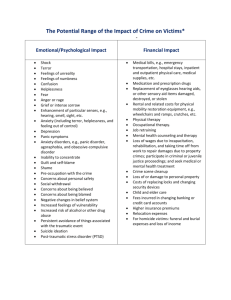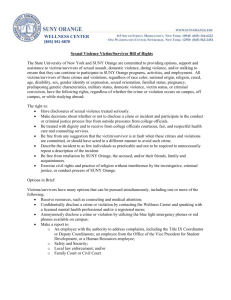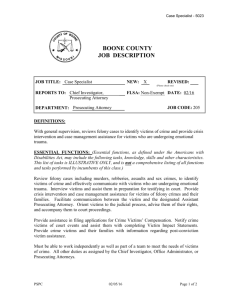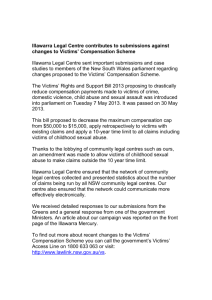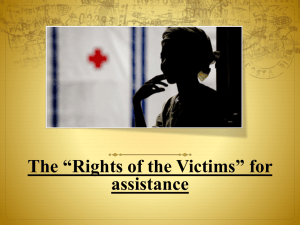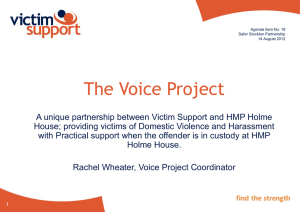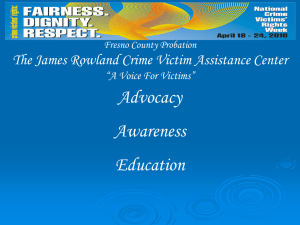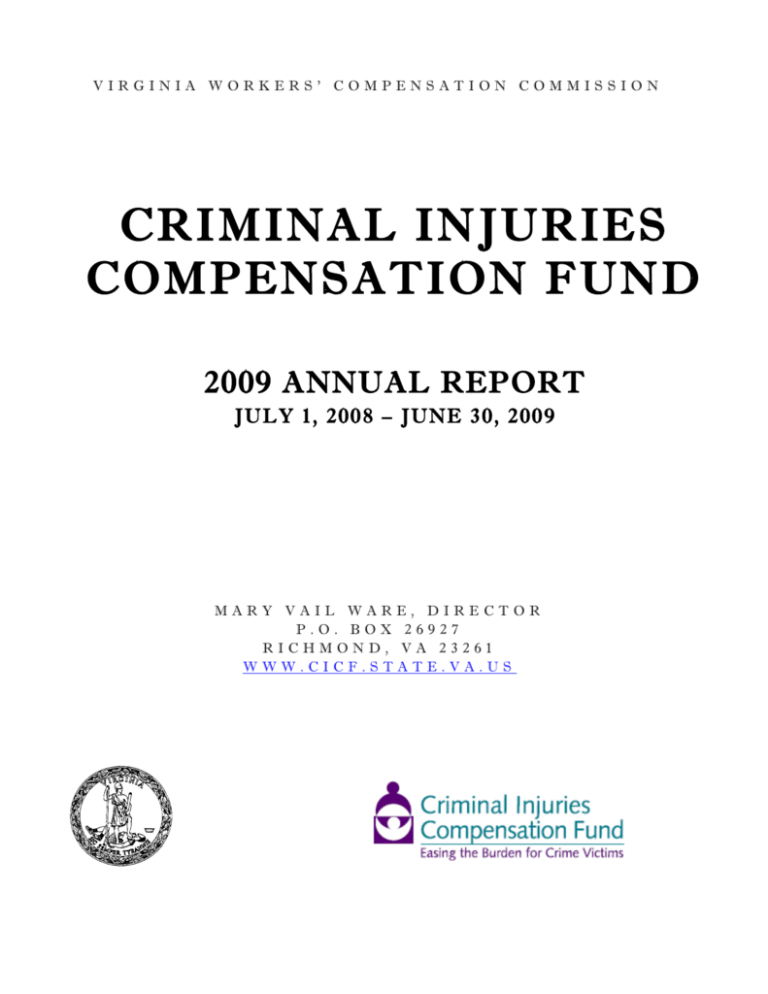
VIRGINIA WORKERS’ COMPENSATION COMMISSION
CRIMINAL INJURIES
COMPENSATION FUND
2009 ANNUAL REPORT
JULY 1, 200 8 – JUNE 30, 200 9
MARY VAIL WARE, DIRECTOR
P.O. BOX 26927
RICHMOND, VA 23261
WWW.CICF.STATE.VA.US
WHAT IS THE CRIMINAL INJURIES
COMPENSATION FUND?
Citing the Commonwealth’s “moral responsibility” to provide financial assistance to victims of
crime, the Criminal Injuries Compensation Fund (CICF) was established by the Virginia
General Assembly in 1977 to pay unreimbursed expenses of innocent victims of crime who had suffered
physical or emotional injury or death (§ 19.2-368.1, Code of Virginia). The fund is administered by the
Virginia Workers’ Compensation Commission.
For over thirty years the Fund has assisted victims of crime and their families by easing the
financial burden that crime often creates, providing relief in the form of reimbursement for medical
expenses, lost wages, funeral expenses, relocation, counseling costs and other “necessary and
reasonable” expenditures incurred by the victim. As of July 1, 2007, claimants are eligible for awards up
to the statutory maximum of $25,000 for compensable expenses (a $10,000 increase over previous years,
a legislative change enacted in the 2007 General Assembly session). By law, CICF is the payer of last
resort, assisting victims with expenses that are not covered by any other source. While the Fund does
take collateral resources into account, assistance from the Fund is not income-based. Since its
inception, the Fund has processed over 30,000 claims from Virginia victims of violent crime.
In order for a victim to meet the Fund’s eligibility requirements, the crime must occur in
Virginia or against a Virginia resident in a state, country, or territory that does not have a compensation
program. The crime must be reported to law enforcement within 120 hours unless good cause for the
delay can be shown. A claim must be filed with the Fund within one year of the occurrence of the
crime unless good cause exists for not doing so. The claim must have a minimum value of $100. The
victim must fully cooperate with law enforcement and must not have engaged in illegal activity or
contributed to his or her injuries in any way. Apprehension and conviction of the offender are not
prerequisites for a crime victim’s CICF eligibility.
New this fiscal year, the Fund began reimbursing the evidence-collection expenses related to
sexual assault forensic examinations through its new SAFE Program (Sexual Assault Forensic
Examination Payment Program). This program addition arose in conjunction with changes made to §
19.2-368.11:1 of the Virginia Code last year as part of the state’s effort to be in compliance with the
federal Violence Against Women Act (VAWA). Paying these expenses allows CICF to maximize fund
reimbursement via the federal Victims of Crime Act (VOCA), bringing additional dollars to crime
victims in the Commonwealth.
The monies awarded to victims of crime in conjunction with compensation claims are
not funded through state tax dollars. CICF is funded by court fees, assessments on offenders, and
restitution as well as federal grant funds to supplement monies available to victims of violent crime
generated by court fines at the federal level. CICF’s new SAFE Program, however, does receive
General Fund via dollars designated to the Virginia Supreme Court to reimburse for sexual assault
evidence collection expenses.
“The mission of the Criminal Injuries Compensation Fund is to
administer the Compensating Victims of Crime Act in a
compassionate, fair and efficient manner. In so doing, the Fund
strives to treat every victim and survivor with dignity and respect,
recognizing the tremendous impact that violent crime has upon our
society.”
2
FISCAL YEAR 2009 IN REVIEW
Fiscal year 2009 represented another record-breaking year for the Criminal Injuries
Compensation Fund (CICF). The number of new compensation claims filed (2098) represented a 3%
increase over the previous fiscal year. This year the Fund provided nearly $3,000,000 in
compensation awards to crime victims and their families, in addition to paying for forensic
examinations for 1651 victims of sexual assault, totaling just over $2.2 million dollars. As in years
past, CICF staff took steps to insure that victims’ CICF awards were able to address as many
compensable expenses as possible through continued efforts to negotiate bills with medical providers on
behalf of claimants. In FY 2009, CICF staff successfully negotiated nearly 300 medical bills on
behalf of claimants, ultimately saving victims of crime over $380,000.
CICF’s involvement in a victim’s care does not stop after an initial award is made. Many victims
of violent crime require longer term care for the physical and emotional injuries they sustain, and CICF
assists Virginia’s victims of crime with these ongoing health needs. In FY 2009, 1081 victims received
supplemental awards totaling $1,262,785. Supplemental awards are issued when an eligible victim
documents the need for additional benefits after the initial award has been entered. CICF continues to
make supplemental awards for the duration of the claimant’s crime-related treatment, until such time as
the claim has reached its statutorily designated maximum payout amount ($25,000 for crimes occurring
after July 1, 2007; $15,000 for crimes occurring prior).
Though the crime categories of adult sexual assault, child physical abuse, DUI, and armed
robbery saw showed decreases this fiscal year in terms of numbers of CICF claims filed, the vast
majority of crime categories were on the rise or showed no change from FY 2008. This year saw
increases in the number of claims based on homicides (including a 9% increase in non-domestic
homicides), child sexual assault (+16%), unarmed robbery (+31%), abductions (+40%), breaking and
entering (+50%), and stalking (+33% in the second year it was covered as a compensable crime by
CICF in Virginia code). The number of arson, carjacking, and assault claims remained relatively stable
from the previous year.
In 2008, changes to §19.2-165.1(B) of the Code of Virginia eliminated the requirement that an
adult victim of an alleged sexual assault participate in the criminal justice system or cooperate with law
enforcement in order to request a forensic examination, or for the Commonwealth to pay for the
examination, a code change which brought Virginia into compliance with the requirements of the
federal Violence Against Women Act (VAWA). In anticipation of a potential increase in the number of
forensic exams requested across the state with this code change, CICF was statutorily designated as
payer of these exams (a duty formerly handled by the state Supreme Court) in order to recoup 60% of
monies paid out through federal Victims of Crime Act (VOCA) funding designated to compensation
programs. In CICF’s first year covering costs of evidence collection in sexual assault, CICF’s SAFE
Program (Sexual Assault Forensic Evidence Program) was tasked with developing payment policies and
procedures and rolling out training statewide to medical providers and advocates on how PERK
(Physical Evidence Recovery Kits) and other forensic evidence collection in sexual assault cases would
be processed. CICF’s new SAFE Program Coordinator also attended the 40-hour classroom portion of
the Forensic Nurse Examiner (FNE) training to enhance familiarity with forensic evidence collection
processes and protocols and worked on developing strong relationships with the state’s forensic nurses.
3
CICF’s new direct-bill system for facilities providing forensic exams streamlined processes, leading to
hospitals receiving payment sooner and decreasing the likelihood that victims would be billed for
forensic evidence collection. Victims of sexual assault also were able to receive information about the
victim compensation process, including an application to apply if they had additional crime-related
expenses and met regular compensation criteria
Professionals within the criminal justice system continue to be the Fund’s most significant
source of referrals, with 68% of FY 2009’s claimants learning about CICF from their area
victim/witness assistance program and another 17% being referred to the Fund from their local
police or sheriff’s department or commonwealth’s attorney’s office. Other victims found out about
CICF from human service agencies, medical providers, probation offices, funeral homes or other
sources. Continued collaboration and training with our criminal justice partners is important to ensure
that potentially eligible victims of crime are able to access the Fund. Fund staff is committed to
increasing outreach to other allied professionals and the community at large about CICF. Enhanced
training efforts in recent years as well as improvements to the program’s website have served to
heighten the Fund’s visibility as staff work toward a vision of CICF’s instant recognition as a resource
when an individual has been the victim of a crime.
Compensation Claims Comparison Summary
(FY 2005 through FY 2009)
2005
2006
2007
2008
2009
Claims Received
1760
1902
2054
2045
2098
Claims Awarded
1327
1448
1418
1591
1142
Claims Denied
440
508
469
535
516
Total $ Awarded
$2,574,424 $2,970,381
$3,262,756 $3,622,000 $2,974,278
Most Frequent Award Type
Most Frequent Crime Categories
1.
Hospital Expenses
1.
Assault (non-domestic)
2.
Funeral Expenses
2.
Homicide
3.
Physician Expenses
3.
Child Sexual Abuse
4.
Lost Wages
4.
Assault (domestic)
5.
Transportation/Mileage
5.
Robbery
4
2009 HIGHLIGHTS AND ACCOMPLISHMENTS
Collaboration
Served on the interdisciplinary Advisory Board and Working Group tasked with updating Virginia’s healthcare response
to sexual assault and establishing a statewide protocol for the acute care of victims of sexual assault (an outgrowth of the
Governor’s Commission on Sexual Violence, to which CICF’s Director was appointed)
Continued partnership with the Department of Criminal Justice Services and the University of Richmond to implement
the Virginia Victim Assistance Academy, a comprehensive training program for advocates and other allied professionals
new to victim services. Staff from CICF served on the Advisory and Steering Committees and participated as Academy faculty
and staff. A CICF staff person was also one of 30 individuals selected to attend 2008’s inaugural academy.
Maintained membership and participation with the National Association of Crime Victim Compensation Boards, the
Virginia Sexual and Domestic Violence Action Alliance, and the Virginia Network for Victims and Witnesses of Crime, Inc.
(with CICF staff active in the Membership, Programs, Compensation, and Executive Committees)
Outreach / Training
Sponsored and underwrote costs of Crisis Response Team (CRT) training, a 24-hour training certified by the
National Organization for Victim Assistance covering techniques and protocols for providing crisis intervention and
psychological first aid. Not offered in Virginia since 2001, this training was open to advocates, clergy, emergency services
personnel, social workers, and others interested in volunteering as a part of the state team to be mobilized to provide crisis
intervention within a community affected by some sort of disaster (mass casualty crime incident, natural disaster, etc.). All
CICF staff received CRT training as well as 35 other individuals from across the state representing a variety of disciplines.
Partnered with the Department of Corrections to conduct a series of trainings across the state for probation and
corrections staff on victims’ issues and resources
Legislative Efforts / Changes
Authored and provided support and technical assistance to HB2612 and SB1150 which took effect July 1, 2009 and
requires public schools, state institutions of higher education, the Board of Health, regional emergency medical services
councils, the Virginia Department of Emergency Management and local emergency management officials to include a provision
in their emergency plans that both CICF and DCJS shall be contacted immediately to deploy assistance in the event of
an emergency as defined in the emergency response plan when there are victims as defined in § 19.2-11.01.
§19.2-368.5 was amended to allow for the electronic filing of CICF claims “in accordance with standards approved by
the Commission”.
Staff Expansion
Hired a Forensic Payment Coordinator to develop policies and oversee payment in conjunction with CICF’s new
statutorily designated responsibility with regard to forensic evidence collection in sexual assault cases
Hired a Medical Provider Liaison to handle status inquiries, collections issues, and training requests from
providers/facilities providing treatment to CICF claimants
Other Items of Note
Established a lockbox through Wachovia Bank for collection of CICF restitution payments to streamline and secure
collections processes
Presented the fifth annual “Victim/Witness Assistance Program of the Year” award to the Lynchburg
Victim/Witness Program at the annual conference of the Virginia Network for Victims and Witnesses of Crime
Utilized a collections agency, NCO Collections, to pursue repayment of monies owed by convicted offenders in cases
where offenders had ignored previous CICF collection efforts
5
FY 2009 REVENUES AND EXPENSES*
BEGINNING CASH BALANCE
$10,392,203
Cash Receipts
CICF (court fees)
$3,283,398
Agency Transfer (for SAFE payments)
$1,800,000
Restitution (including tax set-off and overpayments) $ 441,990
Unclaimed Restitution
$ 460,843
Grant Proceeds
$ 907,000
CRT Training Registrations
$
3,150
Private Donations
$
450
TOTAL RECEIPTS
$6,896,831
Cash Disbursements
Benefits for Victims (compensation claims)
$2,974,278
Benefits for Victims (SAFE claims)
$2,244,066
Administrative
$1,717,891
TOTAL DISBURSEMENTS
$6,936,235
ENDING CASH BALANCE
$10,352,799
*this data has not yet been audited by the Auditor of Public Accounts
“I have to say what a wonderful organization you are. The people working there are
authentic and caring and it shows every time I call for a victim. I personally would like to
say… THANK YOU!!”
- A medical provider treating a CICF claimant
6
CONCLUSION
Victims of violent crime clearly face a myriad of concerns as they struggle to regain control of
their lives and recover both physically and emotionally. The Commonwealth’s Criminal Injuries
Compensation Fund remains dedicated to playing a role in that recovery by assisting Virginia victims
deal with the financial burdens that often accompany victimization. FY 2009 saw a 3% increase in the
number of applications received by the Fund and nearly $3 million dollars awarded in compensation
claims with an additional $2.2 million paid out through CICF’s new SAFE program, covering forensic
examination expenses in sexual assault cases. CICF continued its work helping victims, holding
offenders fiscally accountable and collaborating with a wide variety of service providers (law
enforcement, medical professionals, court services staff, etc.) to best serve the needs of claimants.
2009 brought technological changes to the Fund, with a new phone system and a database
conversion that involved extensive staff training and process changes. The CICF system
implementation project, managed by CAPTech, was tasked with developing a system to replace
the Delphi / MY SQL database system previously used to record and track claims data. The new
system, WENDY, which launched in April, automates many of the previously manual CICF
processes and minimizes duplicative effort. During the course of this system conversion (which
continues into FY 2010), staff has collaborated with CAPTech as subject matter experts (SMEs), tested
systems, provided input, and of course received training on using WENDY. Throughout this
challenging transition, staff has maintained high standards of customer service and responsiveness to
claimants.
Looking ahead to 2010 and beyond, it is most likely that CICF’s claims volume will continue to
increase as CICF staff continues extensive outreach and marketing efforts throughout the state to
educate allied professionals and the community at large about the Fund. In addition, in accordance with
changes to §19.2-368.5 that now allow for electronic filing as well as external capabilities built into
CICF’s new database, CICF staff are working to develop policies, procedures and training for advocates
statewide regarding online claim filing. CICF-certified advocates will be able to assist victims in applying
online and will also have secured web access to limited information in the CICF database, allowing them
to check claim status and see notes from CICF staff on information still needed to perfect a claim.
CICF staff and partners across the state are excited about this enhanced technological capacity that will
allow advocates easier access to CICF information and increase the efficiency of claims processing.
CICF efforts to serve Virginia’s victims of violent crime continue unabated as we look towards
the future. CICF staff remains committed to maximizing operational capacity and looking for ways to
streamline internal processes, collaborate with community partners, and advocate for victims of crime.
Above all else, CICF will zealously maintain its tradition of providing assistance to victims of
crime with compassion, efficiency, and fairness.
“I would like to thank you for all your help in taking care of me financially while I have been
going through this tough healing process, physically and emotionally. The CICF has allowed me
to focus on healing and getting this part of my life behind me without the added stress of
worrying about how I am going to finance my medical care. When my surgeon unjustly sued me,
the CICF came to my defense and took care of the situation with little abetment from me,
allowing me to relax and put this ugly incident in the past. Again, my deepest appreciation and
gratitude to all those at CICF that were part of helping me get through this tough time in my life.”
- a CICF claimant
7



